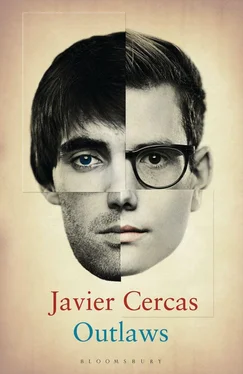‘This idyll lasted for several months, more or less until the summer. At first I must have had satisfaction written all over my face, because everyone noticed something strange, starting with my daughter, who arrived home the day after Tere’s first visit and spent the weekend joking with lethal marksmanship (I don’t recognize you, Dad, she sprung on me several times, laughing. Anyone would think you got laid this week), and ending with Cortés, Gubau and the rest of the people at my office, who benefited from my good mood though they also suffered from my absenteeism, or my inattention. I mean that I began to deal almost exclusively with Zarco’s case and to delegate the rest of the work to Cortés and Gubau, provoking consternation in the office and complaints from some clients, accustomed to being looked after by the senior partner in the firm. But I was too absorbed by my happiness and paid no attention to the complaints or the disconcertion. That doesn’t mean I didn’t work. I was reading, studying, collecting information, arguing details of Zarco’s case with Cortés, with Gubau, sometimes with other lawyers. I often went to see Zarco. On those visits we mostly talked about judicial and prison matters, about his situation in prison and how to improve it; but neither Zarco nor I evaded talking about the past, not even the summer of ’78, especially if we considered some detail or concrete episode from back then could serve to clarify some detail or concrete episode from his later life, and in this way he was able to give me tools with which to defend him. Anyway, our relationship was strictly professional, or almost. I would say we were weighing each other up. In his case I don’t know what the initial balance was in that weighing up; in mine it was that, in spite of his visible physical deterioration and secret moral vulnerability, Zarco was all there: he thought clearly, his behaviour was reasonable, he had a real desire to get out of prison and begin a different kind of life and he seemed capable of doing it.
‘During that time I also saw María Vela with some frequency. We always or almost always saw each other at her flat on Marfà Street, in Santa Eugènia, where she lived with her daughter, a precocious and graceless teenager who was the spitting image of her mother. Seeing her — seeing María, I mean — many must have asked how it was possible that such a woman had become Zarco’s woman. When she and Tere showed up at my office I already knew the story from the press; what I didn’t know was that that story wasn’t the whole story.’
‘I only know what I’ve read in your archive.’
‘The whole story is more interesting; I pieced it together in those first weeks, thanks to María herself, and also thanks to Zarco and Tere. As far as I now understand, the story goes more or less like this. María had started off being one of the many admirers Zarco corresponded with from prison when his media profile was at its peak; there were all sorts among those women: compulsive liars, opportunists, Samaritans, naive women, thick ones, adventurers, I don’t know. In general, at the same time as going along with them, Zarco had known how to manage them and get them to work for him, because he understood very early that a great part of his wellbeing inside depended on help he got from the outside, getting his case moving with barristers, solicitors, officials, judges and politicians. My impression is that María must have combined ingredients of all or almost all the types of admirers, but the fact is the press chose to present her as a Samaritan in love.
‘I’m not saying that she wasn’t in part, at least at the beginning. She first got in touch with Zarco towards the end of the eighties, when he was locked up in the Huesca prison and announced in public declarations to El Periódico de Aragón his intention to start a magazine and asked for volunteers to help him. María was one of the people who offered to collaborate in the production and distribution of the magazine, and, although they didn’t manage to publish a single issue, from that moment on she began to write to him regularly. That’s how Zarco found out she was four years younger than him, that she’d been married and was separated, that she had a two-year-old daughter and had always lived in Barcelona but had just moved to Gerona, where she worked in a school cafeteria; and that’s how he found out later, as María levelled with him and her letters grew inflamed, that she had been reading everything written about him for a long time, that she’d fallen in love with him without ever meeting him, that she was willing to do anything for him, that she was sure that — as she had done years ago for her ex-husband, for whom she’d managed to get a special pardon — she could get him out of prison and begin a new life with him. Zarco didn’t pay too much attention to this offer, perhaps because María’s photos didn’t make her look too seductive, perhaps because at that time he was receiving similar offers from his epistolary harem of women who flirted with him from a distance; remember that, although he was behind bars, Zarco was then one of the guys most in demand in this country, a sort of icon of the recent democracy: they were making films about him, writing books and songs about him, publishing his memoirs, the newspapers and radio stations interviewed him on the slightest pretext, the intellectual journals dedicated special issues to him, his photograph appeared everywhere beside politicians, football players, bullfighters, actors, singers, writers, film-makers and celebrities, and the gossip magazines claimed he had romances with Socialist politicians, Andalusian aristocrats, beauty queens, high-school teachers, female prison guards and television presenters. So, although María kept writing to him, in the midst of that whirlwind Zarco tired very early of answering her letters, and didn’t do so again until, in the mid-nineties, he himself destroyed his public image with a couple of failed attempts at rehabilitation, the media’s interest in him plummeted and his harem of admirers disappeared. María did not miss her moment. No longer with any competition, she started to claim Zarco’s attention again, she won it and began to visit him and to have encounters alone with him in prison (face-to-face encounters they call them: a euphemism to avoid calling them sexual encounters); Zarco for his part went along with it. That was when María became what she was when I met her in my office: Zarco’s official girlfriend and the person on the outside who looked after his affairs.’
‘And in that capacity she visited you that day.’
‘That’s right.’
‘And Tere? In what capacity did Tere go to your office?’
‘As María’s helper or bodyguard and as someone Zarco trusted. That was the role she’d been filling for years and that she more or less carried on doing for a while. María was ideal for Zarco for tons of reasons: because she was a normal woman, with no criminal record, because she was a mother and aside from that a respectable separated mother, because she was in love with him, because she was always available, for her air of vulnerability, for everything; but even though she was ideal, Zarco didn’t think she was smart and didn’t trust her, or he thought Tere was smarter and more trustworthy, and so he started to ask her to accompany María, or Tere herself offered to do so. And that’s how that singular couple came to be.
‘But I was telling you about my conversations with María. I saw her at least once a week too, at her home on Marfà Street. That was where I began to realize her character had some duplicity and that, more than vulgar or insignificant — which is what she seemed at first — she was one of those people of such obvious ingenuousness and such total transparency that they ended up being enigmatic. One of the things that surprised me was that María still had the idealized vision of Zarco that the media had propagated for years, a vision according to which Zarco was a noble, brave and generous youth condemned by the fate of his birth to a life of delinquency; I found it even more surprising that María still had an idealized vision of her relationship with Zarco: according to her, her story was a love story of a good, simple and unlucky woman for a good, simple and unlucky man, a love story that overcomes all, a romantic love that, once Zarco had his freedom, was going to give her and her daughter the husband and father they’d lost and Zarco the family he’d never had. In those first interviews María told me the same story several times (or different stories that deep down were variations of the same one), and one afternoon, unexpectedly, as I was walking towards my car after having spent hours listening to her I seemed to understand that the story was the answer I’d been looking for, the key that could unlock the flow of media interest in Zarco and, therefore, the key also to Zarco’s freedom: he had told his life story to the press many times as a repentant and reformed delinquent, unjustly kept behind bars; but, after he himself had refuted it so many times by reoffending, it was difficult for anyone to believe it, especially if he was the one telling it; but, if that same story, corrected, improved and expanded, was told by a school cafeteria worker, a relatively young woman, on her own, decent, poor and separated, wrapped in an air of submission and disgrace and with a daughter as well (a daughter who could also allow Zarco to present himself as a future head of a household), then the possibility existed that the media might believe it or at least believe that it was credible, spreading it, reviving interest in Zarco and helping me get him out of prison. In any case I reached the conclusion that, without that help, it would take me much longer to get Zarco released, if I ever could; I also arrived at the conclusion that it was at least worth trying.’
Читать дальше












